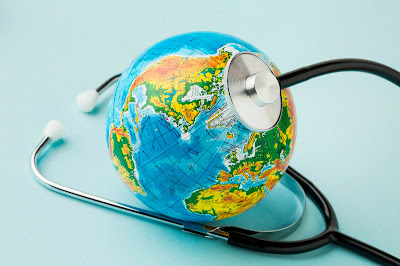Introduction:
In recent years, medical tourism has become a thriving global industry, attracting millions of people who seek high-quality medical treatments at more affordable prices abroad. What was once considered a niche option has evolved into a mainstream choice for patients seeking everything from complex surgeries to cosmetic procedures in foreign countries. The prospect of combining medical care with travel to exotic destinations has made medical tourism an attractive option for those looking to optimize their health and well-being without breaking the bank.

This article will explore the growing trend of medical tourism, examining
its benefits, potential risks, popular destinations, and tips for ensuring a
safe and successful experience. Whether you're considering traveling abroad for
surgery, dental work, or other treatments, understanding the pros and cons of
medical tourism is essential for making an informed decision.
What is Medical Tourism?
Medical tourism refers to the practice of traveling to another country to
receive medical care, often at a lower cost or for treatments that are not
readily available in the home country. Patients opt for medical tourism for a
variety of reasons, including:
Cost savings: Medical procedures can be significantly cheaper in countries with lower healthcare costs.
Access to specialized treatments: Some countries offer cutting-edge
treatments or specialists that may not be available or accessible in the
patient's home country.
Reduced wait times: In certain countries, long wait times for surgeries or
treatments can prompt patients to seek care elsewhere.
Combining healthcare with travel: Many medical tourists take advantage of
their trip to explore new destinations, effectively turning their medical
journey into a vacation.
The range of treatments sought through medical tourism is broad and
includes cosmetic surgery, dental work, cardiovascular procedures, fertility
treatments, orthopedic surgeries, and even organ transplants.
Benefits of Medical Tourism:
Medical tourism offers a host of benefits, making it an appealing option for patients seeking affordable and high-quality care. Here are a few of the main benefits:

1. Cost Savings:
One of the primary drivers of medical tourism is the opportunity to save
money. In many cases, medical procedures in countries like India, Thailand,
Mexico, and Turkey can cost a fraction of what they would in the United States,
Canada, or Western Europe. The savings can be particularly significant for
elective procedures such as cosmetic surgery, dental implants, and fertility
treatments, where insurance may not cover the costs.
For example, an orthopedic procedure like knee replacement surgery may cost $30,000 to $50,000 in the United States, while the same surgery in India or Thailand might cost between $7,000 and $15,000. This cost differential can make a huge difference, especially for those without comprehensive health insurance.
2. Access to High-Quality Care:
Contrary to popular belief, lower costs do not necessarily equate to lower
quality. Many medical tourism destinations have world-class hospitals and
healthcare facilities with highly trained doctors, many of whom have received
international certifications or training in countries like the U.S., U.K., and
Australia. Several hospitals in popular medical tourism destinations are
accredited by Joint Commission International (JCI), a gold standard in
healthcare quality.
Countries like Singapore, South Korea, and Malaysia are renowned for their state-of-the-art medical facilities and expert healthcare providers, offering services comparable to, or even exceeding, those found in Western countries.
3. Shorter Wait Times:
For patients in countries with public healthcare systems, long wait times can be a significant issue, particularly for non-emergency surgeries and procedures. Medical tourists often benefit from reduced wait times, as private international hospitals tend to offer faster access to treatments and surgeries. This can be a crucial factor for patients suffering from painful or debilitating conditions who cannot afford to wait for months or even years for treatment.

4. Access to Advanced Treatments and Technology:
In some cases, medical tourism allows patients to access cutting-edge
treatments and innovative technologies that may not yet be available in their
home country. For example, certain cancer treatments, regenerative medicine, or
specialized surgeries might be more readily available in countries with
advanced medical research facilities, such as Germany or South Korea.
5. Combining Medical Treatment with Travel:
For many medical tourists, the opportunity to travel abroad is an added
bonus. Some patients choose destinations that allow them to recuperate in a
relaxing, exotic environment after their medical procedure. Countries like
Thailand, Mexico, and Costa Rica are popular medical tourism destinations that
also offer beautiful beaches, cultural experiences, and opportunities for rest
and relaxation.
Risks and Challenges of Medical Tourism:
Despite its many advantages, medical tourism is not risk-free. Patients should carefully consider these
potential drawbacks before deciding to travel abroad for medical care.
1. Quality and Safety Concerns:
The quality of medical care can vary significantly from country to country
and even between hospitals within the same country. While some international
hospitals maintain high standards, others may not meet the same level of care
and safety as those in the patient’s home country. It's essential to research
the credentials of hospitals and healthcare providers thoroughly, ensuring that
they are accredited by reputable organizations and have a track record of
success.
2. Postoperative Complications:
One of the risks of undergoing surgery or medical treatment abroad is the
potential for postoperative complications that may arise after the patient has
returned home. If complications occur, it can be challenging to receive follow-up
care or corrections from the original medical provider. Furthermore, local
doctors may be hesitant to treat complications arising from procedures
performed abroad, adding to the complexity of aftercare.
3. Legal and Ethical Issues:
Medical tourists may face challenges when it comes to legal recourse. In
the event of medical malpractice, the patient’s ability to file a lawsuit or
seek compensation may be limited by the legal systems of the country where the
treatment was performed. Additionally, medical tourism can raise ethical
concerns, particularly in cases involving organ transplants or surrogacy, where
regulations may differ significantly from those in the patient’s home country.
4. Language and Cultural Barriers:
Communication can be a significant challenge for medical tourists,
especially when traveling to countries where healthcare providers may not speak
the patient’s native language fluently. Miscommunication can lead to
misunderstandings about treatment plans, consent forms, and medical history,
potentially increasing the risk of errors. Cultural differences in medical
practices and patient expectations can also contribute to confusion and
dissatisfaction.

5. Travel-Related Risks:
Traveling long distances for medical care can present additional risks,
particularly for patients undergoing surgeries or procedures that require a
significant recovery period. Long flights after surgery can increase the risk
of deep vein thrombosis (DVT), and the physical stress of travel can complicate
recovery. Patients should also consider the potential for infection or
complications due to differences in hygiene standards in certain countries.
Popular Medical Tourism Destinations:
Medical tourists have a wide range of destinations to choose from, each
offering different specialties, pricing structures, and levels of care. Below
are some of the most popular countries for medical tourism, along with their
key specialties:
1. India:
India is one of the top destinations for medical tourism, known for its
affordable healthcare and expertise in complex surgeries such as cardiac
procedures, orthopedic surgeries, and organ transplants. Many hospitals in
India are JCI-accredited, and patients can expect high standards of care at a
fraction of the cost compared to Western countries.
2. Thailand:
Thailand is famous for both its cosmetic surgery and dental tourism
industries. In addition to offering high-quality medical services, Thailand is
a popular destination for those looking to combine medical care with a relaxing
vacation. Bangkok and Phuket are home to some of the country’s top medical
facilities.
3. Mexico:
For patients from the United States and Canada, Mexico is a convenient and
cost-effective option for a wide range of treatments, from cosmetic surgery to
bariatric procedures and dental care. International patients are the focus of
many clinics in places like Tijuana and Cancun, which provide packages that
include lodging and transportation.
4. Turkey:
Turkey has emerged as a leading destination for hair transplants, cosmetic
surgery, and eye care. With its modern healthcare infrastructure and
competitive pricing, Turkey attracts patients from across Europe and the Middle
East. Istanbul is home to many world-class hospitals and clinics specializing
in medical tourism.
5. Costa Rica:
Costa Rica is a top destination for dental tourism and cosmetic surgery,
offering high-quality care at significantly lower costs than in the United
States. With its proximity to North America and reputation for excellent
healthcare standards, Costa Rica is a popular choice for patients seeking
affordable treatments in a beautiful setting.
How to Ensure a Successful Medical Tourism Experience:
If you're considering medical tourism, it's essential to take steps to minimize risks and ensure a smooth, successful experience. The following advice will help you get through the process:

1. Research Thoroughly:
Before choosing a destination or healthcare provider, conduct thorough
research into the hospital or clinic’s accreditation, the qualifications of the
medical staff, and reviews from previous patients. Look for JCI-accredited
facilities or those certified by reputable international organizations.
2. Verify Costs and Inclusions:
While medical tourism is often more affordable, make sure to verify all
costs up front, including the procedure, hospital stay, medications, and any
necessary follow-up care. Some medical tourism packages may include travel,
accommodation, and even post-surgery recovery in a resort-style environment,
while others may not.
3. Consult Your Local Doctor:
Before making any decisions, consult with your local doctor or specialist
to discuss your treatment options and whether medical tourism is a good fit for
your situation. They can help you assess the risks and determine whether it's
safe to travel for the procedure.
4. Plan for Postoperative Care:
Ensure that you have a clear plan for postoperative care, including
follow-up visits, medication, and recovery time. If complications arise, you
may need to stay in the destination country longer than expected, so plan
accordingly.
5. Purchase Medical Travel Insurance:
Consider purchasing medical travel insurance that covers the costs of medical care abroad, as well as any potential complications or necessary medical evacuation. This can provide peace of mind and financial protection in the event of an unexpected issue during your trip.

Conclusion:
Medical tourism is a rapidly growing industry that offers patients the
opportunity to receive high-quality care at lower costs while exploring new
destinations. With careful research and planning, medical tourists can enjoy
the benefits of affordable treatments, reduced wait times, and access to
advanced healthcare technologies.
However, it’s essential to weigh the potential risks, including quality concerns, legal issues, and travel-related complications. By taking the time to choose a reputable provider, verifying all costs, and planning for postoperative care, you can minimize risks and ensure a positive medical tourism experience.
As the demand for global healthcare continues to grow, medical tourism will likely remain a popular option for patients seeking affordable and effective medical treatments abroad.





0 Comments